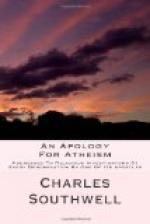Now, we should like to be informed by what reasonable right Newton could pen a long string of ‘incontestible truths,’ such as are here selected from his writings, with respect to a Being of whom, by his own confession, he had not a particle of knowledge. Surely it is not the part of a wise man to write about that which is ‘totally unknown’ to him, and yet that is precisely what Newton did, when he wrote about God.
There is, however, one remark of his respecting the God he thought necessarily existed, worthy of notice, which is, that ’human beings revere and adore Gad on account of his (supposed) sovereignty, and worship him like his slaves;’ for to all but worshippers, the practice as well as principle of worship does appear pre-eminently slavish. Indeed, the Author has always found himself unable to dissociate the idea of worshipping beings or things of which no one has the most remote conception, from that of genuine hypocrisy. Christians despise the rude Heathen for praying to a Deity of wood or stone, whom he soundly cudgels if his prayer is not granted; and yet their own treatment of Jehovah, though rather more respectful, is equally ridiculous. When praying, they lay aside truth, sincerity, and sanity. Their language is the language of fawning, lying, imbecile, cowardly slaves. Intending to exalt, they debase the imaginary object of their adoration. They presume Him to be unstable as themselves, and no less greedy of adulation than Themistocles the Athenian, who, when presiding at certain games of his countrymen, was asked which voice pleased him best? ’That,’ replied he, ’which sings my praises.’ They love to enlarge on ’the moral efficacy of prayer,’ and would have us think their ‘omnipotent tyrant’ best pleased with such of his ‘own image’ as best ‘sing his praises.’ Of their ‘living God’ they make an amplified Themistocles, and thus reduce (conscientiously, no doubt,) the Creator to a level with His creature.
The author is without God; but did he believe there is one, still would he scorn to affect for Him a love and a reverence that nothing natural can feel for the supernatural; still would he scorn to carry favour with Deity by hypocritical and most fulsome adulation.
Finely did Eschylus say of Aristides—
To
be and not to seem is this man’s maxim;
His
mind reposes on its proper wisdom,
And
wants no other praise.
Tell us, ye men of mystery, shall a God need praises beneath the dignity of a man? Shall the Creator of Nature act less worthily than one of his creatures? To do God homage, we are quite aware, is reckoned by Christians among their highest duties. But, nevertheless, it seems to us impossible that any one can love an existence or creature of which he never had any experience. Love is a feeling generated in the human breast, by certain objects that strike the sense—and in no other conceivable way can love be generated!




